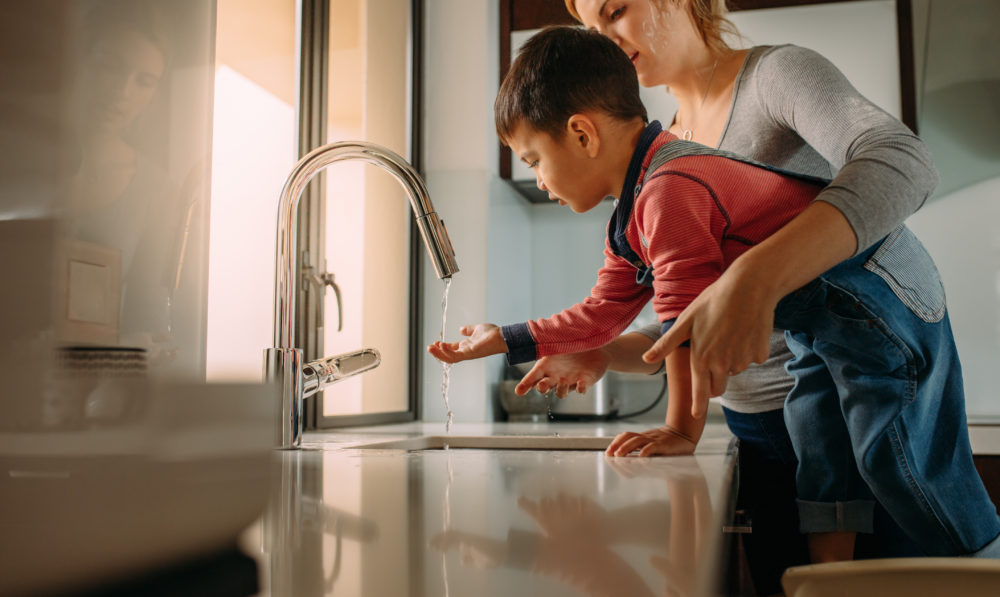America is in the midst of a pervasive disruption of life as the country battles an unprecedented health crisis, the likes of which few of us have ever seen before. COVID-19, or coronavirus as it’s commonly called, has become a global pandemic and Americans are bracing for the trauma a health crisis of this scale will bring. Trauma can affect us all differently and it’s important that we all understand the seriousness of our current reality. What is already a difficult task for adults, however, becomes a larger challenge for our children, who may be asking a lot of questions that parents and guardians aren’t prepared to answer.
 If you’re experiencing this with your children or any adolescents in your family, you’re not alone. Our very own Reverend Howard West, Executive Director of Spiritual Life at Country Meadows, has put together some guidelines to help navigate this difficult conversation with our children. We hope this brings you comfort and aids in explaining this topic to your children during this challenging time.
If you’re experiencing this with your children or any adolescents in your family, you’re not alone. Our very own Reverend Howard West, Executive Director of Spiritual Life at Country Meadows, has put together some guidelines to help navigate this difficult conversation with our children. We hope this brings you comfort and aids in explaining this topic to your children during this challenging time.
Communicate as much as you can
When choosing to talk to your children about the COVID-19 pandemic, or in any instance of speaking about serious topics, make sure you are in a safe and calm environment. It is natural for children to be curious and ask questions. Let them. Allow them to speak freely and practice active listening when they do speak. This will help your child or children stay engaged and have their feelings be validated.
Try asking open ended questions to allow them to process what they are learning, and make sure they are given an equal opportunity to keep the dialogue going as much as they need in order to fully understand the information you’re giving them. A few appropriate questions in this case might be, “How are you?”, “How do you feel right now?”, or “What do you know about the virus or people getting sick?”
With smaller children or with adolescents who have a hard time concentrating, having this conversation while doing other activities like drawing or putting together a puzzle can help them to stay focused for a longer period of time.
Be honest and clear in a child-friendly way
Children, like adults, have a right to know the truth. It is naïve to think that they won’t learn or hear about COVID-19 as the situation unfolds. Parents and guardians must take the lead to show they are a reliable and safe source of information and be upfront with honest conversation. Of course, always be mindful of anxieties and fears and adjust your language regarding this pandemic accordingly.
In an ever-changing crisis such as this, solid information is difficult to keep track of. This is no excuse to make up answers to questions, however. If you find yourself at a loss for an answer, be honest. This can be as simple as saying, “I don’t know, but I will find out.” Children’s minds are like a sponge, and they will soak up the words you tell them. It’s also important not to sugar coat information, either. Try to be realistic that this is a serious health issue when reassuring them that they are safe at home.
As your child processes the severity of COVID-19, they may start to feel scared. Letting your children know that these feelings are okay will help them to remain calm. Validating feelings is part of the way children learn to properly process their emotions. Because this topic is so alarming and traumatic, try to maintain age-appropriate reassurances when talking to your children. And sadly, be prepared to talk about death if or when needed. If you practice all of the steps listed so far, you’ll be able to maintain a calm and meaningful, albeit somber, conversation.
Teach and maintain good hygiene habits
You are a role model for your children, so you should demonstrate proper hygiene at all times. Practice washing your hands together and encourage your kids to wash their hands frequently. Also remember to warn children about touching their faces or rubbing their noses, and make sure you are doing the same. To lighten the mood around this topic, parents can make a game out of teaching their kids to sneeze or cough properly and offer fun incentives to encourage the behavior. This can be especially helpful for younger children and toddlers. All of these teachable moments can help children to process the situation further and will solidify best practices for the future.
Limit media exposure, reassure and give direction
Limiting the amount of media exposure to young children cannot be stressed enough. It’s so important, in fact, that adults should heed this advice as well. There are a lot of evolving factors surrounding COVID-19, and while communication is key, your children should hear that information calmly and concisely, while looking to you as their trusted source. Fear can spread much faster than any disease, and the media attention, although warranted, may trigger anxieties in children that they don’t know how to conquer yet.
Parents should also limit their children’s ability to find information online. While you don’t want to set strict boundaries that will scare children, parents should be wary of frightening images and content that can easily be found through any medium. Encourage your children to come to you first if they want to learn about COVID-19, and you can monitor the media exposure they have together. This will also give you the chance to reassure them as they are consuming information and will allow you to inform them of all of the different ways doctors, scientists, and other professionals are helping to keep everyone safe.
It may be hard to give direction during this unprecedented time. But a wonderful distraction that can help children move on from this scary topic is to set up playtime or enrichment schedules. By playing with your children and making fun memories, children can take their mind off of the overwhelming amount of information they’re receiving. And it won’t be bad for parents either.
Help maintain family and social connections
While the world practices “social distancing,” be aware of all the ways you can still stay socially connected. Thanks to technology, we have the ability to video chat or call friends, family, and teachers to alleviate the stresses of isolation. Connecting with others through social media or by phone will greatly combat feelings of helplessness and restlessness, especially in children. If you feel comfortable, you can also go outside for a walk and some fresh air, as long as you follow guidelines on keeping a safe distance from others.
Take care of yourself and reach out for help if you need to
There is one rule above all other rules as the world fights against the spread of COVID-19: take care of yourself. Parents should check in with their friends and family so as to not isolate themselves and feel stressed. Social breaks for adults are just as important as they are for children when focusing on physical and mental health.
Traumatic times can trigger PSTD in adults and children, and it’s important to know that help is always available when needed. If you feel that you or your children are ill or dangerously anxious, reach out for help. You can contact the Substance Abuse and Mental Health Services hotline, (SAMHSA) at 1-800-985-5990, the National Child Traumatic Stress Network at netsn.org, or UNICEF at unicef.org.
Country Meadows is committed to maintaining a healthy and safe environment for all of our residents and we’re happy to offer these tips to our community members who may be struggling during this time. We hope that our tips on how to speak with your children will help families to make it through this difficult era safely and calmly. To learn more on how Country Meadows is taking precautions against the spread of COVID-19, visit our website.




Thank you, Rev. West, for a very well-thought-out and comprehensive plan to guide parents to have conversations about the corona virus or any other frightening subject that children might be anxious about. I also appreciate that you addressed controlling the amount of time children spend on the internet or television, gathering information which is definitely geared to the negative and scary parts of the news.
I will be sharing this with my grown children to use with their children. God bless you!